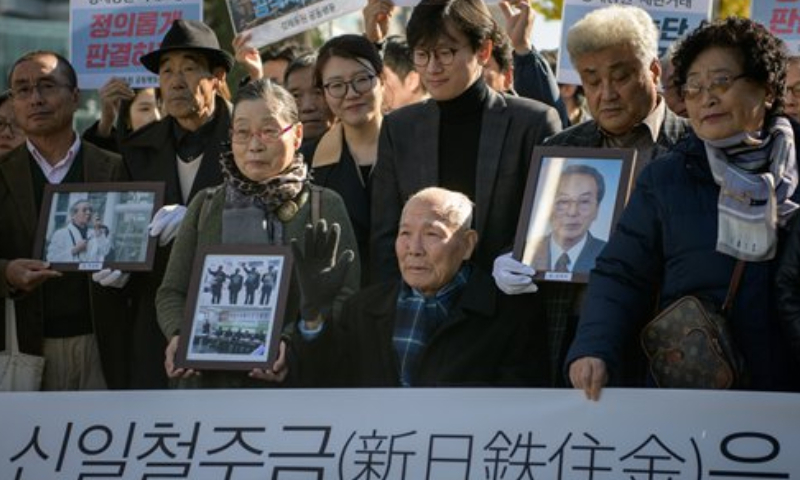S.Korea, Japan may reach settlement at bilateral summit under US pressure but forced labor feud hard to heal: analysts

Lee Chun-sik (center), a victim of forced labor by Japan during its colonial rule of the Korean Peninsula from 1910 to 1945, is surrounded by supporters and relatives outside the supreme court in Seoul on October 30, 2018. Photo: AFP
It is of great concern for South Korea, Japan and the US on whether the settlement over the forced labor issue between South Korea and Japan could be finally reached and their bilateral ties mended during the upcoming South Korean president's first Japan trip in 12 years. Chinese analysts believe even if the settlement is reached with the US pressure behind the scene, the historical feud is hard to heal and that the bilateral ties are unlikely to see big improvement.
South Korean President Yoon Suk-yeol will travel to Japan for talks on Thursday with Japanese Prime Minister Fumio Kishida, days after South Korea announced a plan to end a row between the US allies over wartime forced labor, Reuters reported on Tuesday.
The report noted that Yoon's two-day visit to Japan will be the first such trip by a South Koran leader in 12 years.
Due to the lack of time, it will be difficult to summarize their respective positions and draw up a joint declaration, so the summit will not issue a joint declaration, YNA cited a senior official in South Korea's presidential office as saying on Wednesday.
The meeting will come after South Korea said last Monday that its companies would compensate victims of forced labor under Japan's colonial rule from 1910-1945, seeking to end a dispute that has undercut US-led efforts to present a unified front against China, Reuters said in last Thursday's report.
Relations plunged to their lowest point in decades after South Korea's Supreme Court in 2018 ordered Japanese firms to pay reparations to former forced laborers. Fifteen South Koreans have won such cases, but none has been compensated, according to media reports.
This visit will be "an important milestone in the improvement of relations between South Korea and Japan," Yoon's national security adviser, Kim Sung-han, told a briefing on Tuesday.
But obviously the South Korean public and opposition parties hold different views. Yoon's proposal to resolve the labor dispute drew immediate domestic backlash from former forced laborers and their supporters. They demanded direct compensation from the Japanese companies and a fresh apology from the Japanese government, AP reported.
Yoon's resolution of compromise didn't also seem to receive a warm response from Japan despite Kishida saying he welcomes the resolution last Monday, Lü Chao, an expert on the Korean Peninsula at the Liaoning Academy of Social Sciences, told the Global Times on Wednesday.
The Chinese analyst noted that Japanese major media outlets have covered the resolution and Yoon's upcoming visit "indifferently."
According to the Japanese media, Tokyo is planning to accept Seoul's proposal in general, but some Japanese politicians said it should be cautious considering that South Korea had broken the agreement with Japan multiple times.
In reality, it's the US that is the most excited about the resolution and the upcoming Japan-South Korea summit as the country is seeking to tie the two allies closer to its anti-China strategy, Lü said.
US President Joe Biden said last Monday that Seoul's proposal was "a groundbreaking new chapter of cooperation and partnership between two of the United States' closest allies."
Clearly, Yoon is following Washington's intention to mend ties with Tokyo, Lü said.
But even if the settlement is reached during Yoon's Japan visit, the long-fostering historical feud is hard to heal and the bilateral ties unlikely to see a leap in the short run, the analyst said, warning that the antagonism between the two peoples may even be stronger if the settlement is reached.
In South Korea, following Yoon's proposal, his approval rating fell to 38.9 percent, dropping below 40 percent for the first time in four weeks, YNA reported Monday.
In Japan, the anti-South Korean sentiment may rise considering Yoon's diplomacy of compromise, Lü predicted.
The analyst believes that Japan may provide petty favors to South Korea, for example revoking some sanctions on crucial supplies for the semiconductor industry, if settlement over the forced labor is reached during Kishida-Yoon meeting.
As what Japan and the US are truly interested in is the so-called protection mechanism for the exchange of military information among the US, Japan and South Korea, Lü urged Yoon not to blindly follow the US strategy and serve US' and Japan's interests, which could make it go further apart from its independent diplomacy, harm Asia's stability and security, and even sacrifice its own national interests.

